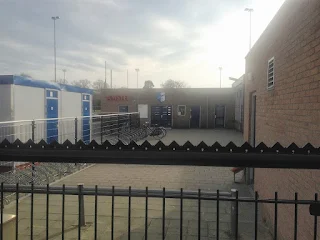SV Blauw Wit is an amateur football club from the Dutch
city of Nijmegen, which was founded on the 14th November 1914 by Mr J
Melssen. The team had a strong religious background and was initially led by Father
Welter, starting out life playing on land belonging to a farmer, Hent Albers.
Before long, the team moved to a meadow in Rush to the
south of the city. From there, Blauw Wit were on the move once more, this time
north to a ground at Dennenstraat. By 1927, the club known at the time as RKSV
Blauw Wit reached the highest class of Catholic football.
Following a
merger of the football authorities following World War Two, the club was
placed in the highest grade of Nijmegen football. Within a
year, they were promoted to the fourth tier of KNVB Sunday football. The team
finished as runners-up of Vierde Klasse 4H in 1946-47, remaining in that
division until the completion of the 1955-56 campaign.
This was two years after Blauw Wit had to give up their ground to the housing association, moving to a pitch in De Goffert, where NEC Amateurs would later play. The move didn’t work out too well as the team was relegated back to local football.
To make the
club more accessible to non-Catholics, RKSV was replaced by SV, Sportvereniging
Blauw Wit, to give them their full title. Another move followed for the 1963-64
campaign as the club moved to Sportpark De Schoonhorst, where the members built
the first clubhouse to cater for the several pitches on site.
This allowed the club to rejoin Vierde Klasse 4E, where a runners-up place followed in 1969-70 before the title was captured in 1973-74. Membership grew in the club, leading to a larger clubhouse being built at the same time.
Two seasons
later, the team was promoted once again to Tweede Klasse 2A, before being
relegated in 1978-79. Blauw Wit played four seasons in Derde Klasse before
another demotion in 1982-83.
The club recovered back at Vierde Klasse level, finishing as 4E runners-up in 1985-86 before lifting the title in 1987-88. A runners-up place was followed a couple of seasons later in 1990-91 with promotion from Derde Klasse via the play-offs.
Their spell
lasted two seasons in Tweede Klasse before being relegated from 2A in 1992-93.
The slide continued when Blauw Wit were relegated back to Vierde Klasse in
1995-96. There was no improvement before another drop in level in 2005-06.
The club continued serving the communities of local neighbourhoods of Voorhees and Neerbosch with over forty teams playing out of the club, with the first eleven winning the Vijfde Klasse 5E title at the first time of asking. The 4E title was collected in 2009-10 before the team returned twelve months later.
Undeterred, they climbed straight back out of Vierde Klasse to play in Derde Klasse 3D
until dropping back down in 2014-15. Again, Blauw Wit recovered immediately to lift the 4E title in 2015-16 to take up their position in Derde Klasse 3D football, where they finished fifth in 2018-19.
Charles Kazlauskas was the team trainer around this time before he was replaced by Roel Hendriks. The side moved to the C section, from where they were relegated in 2022-23, down to the eighth-tier Vierde Klasse Sunday football. The team narrowly avoided another relegation the following season.
SV Blauw Wit
will play in the Zondag Vierde Klasse D in the 2025-26 season.
My visit
Sunday 19th January 2014
My visit to the Netherlands was going well, and I was ahead of my schedule in Nijmegen. I’d even found SCH, a club I hadn’t even
heard of before, as the bus passed, when seeking out Blauw Wit.
From SCH, I took a twenty-minute walk, finding myself on Energieweg,
a little behind schedule as I was heading to the 12.30 kick-off at De Goffert
between NEC and ADO Den Haag. The sun was shining brightly as I arrived, which
didn’t really help my photography.
De Schoonhorst had four pitches, with the main one having an
artificial pitch, while a match was going on. Two sides of it had hedges as fences.
The pitch had hard standing all the way around, without any cover or stands.
The near side was by the expansive car park and clubhouse and was protected by
high fencing.
Having taken my photos, I headed off down Dennenstraat,
past where Blauw Wit once played, to my next location, Quick 1888.
.png)






